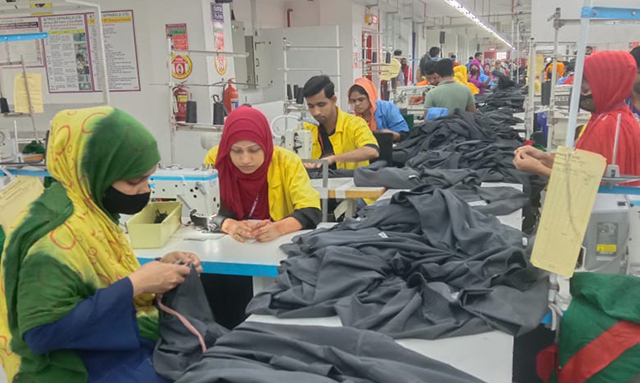Production Lead Time - As a Custom Workwear Manufacturer Factory
As a Custom Workwear Factory, we recognize the significance of efficient production lead times in meeting our clients’ demands and expectations. Our commitment to delivering quality workwear promptly is a testament to our expertise, dedication, and operational excellence.
With timelines customized to meet your specific order quantities:
For 600 pcs, we require 10 days.
For 1000 pcs, we require 12 days.
For 2000 pcs, we require 15 days.
For 3000 pcs, we require 18 days.
For 5000 pcs, we require 20 days.
For 10K to 20K, we require 25 days.
For 50K, we require 30 days.
Production time depends on product design and quantity. It’s always changeable.

Production Lead Time for Workwear Manufacturing in a Bangladesh Custom Workwear Factory
Managing production lead time is crucial for any manufacturing process, particularly in the workwear industry. For a Bangladesh Custom Workwear Factory, managing production lead time effectively is essential for meeting client expectations, ensuring high-quality output, and staying competitive in the global market. Production lead time refers to the total time taken from receiving an order to the final delivery of the products, including design finalization, material procurement, cutting, stitching, quality control, and shipment. Efficient management of production lead time can significantly influence the factory’s ability to fulfill orders on time while maintaining high-quality standards. Let’s explore the various aspects of production lead time and how it impacts workwear manufacturing in Bangladesh.
Factors Affecting Production Lead Time
There are several factors that affect the production lead time in a Bangladesh Custom Workwear Factory. One of the primary factors is the complexity of the order. Custom workwear often involves specific designs, branding, and functional requirements, such as safety features or weather-resistant materials. These customizations require extra time in both the design and manufacturing processes.
Another important factor is material sourcing. A Bangladesh Custom Workwear Factory may need to find specific fabrics, accessories, and components to meet client specifications. If these materials are not readily available, production can be delayed. To minimize this risk, factories often depend on established relationships with suppliers to ensure a steady supply of raw materials.
Labor availability and factory capacity also significantly affect production lead time. During peak seasons or periods of high demand, a Bangladesh Custom Workwear Factory may need to increase its workforce or adjust shift schedules to meet tight deadlines. Proper resource allocation ensures that the factory can handle multiple orders simultaneously without compromising quality.
Steps to Reduce Production Lead Time
A Bangladesh Custom Workwear Factory can implement several strategies to reduce production lead time and improve efficiency. First, investing in advanced machinery and automation can significantly speed up manufacturing. By using automated cutting machines, computerized sewing systems, and digital design tools, factories can reduce manual labor and eliminate potential bottlenecks.
Another effective strategy is to improve supply chain management. A Bangladesh Custom Workwear Factory that collaborates closely with suppliers can anticipate material shortages, negotiate better lead times for fabric delivery, and ensure the timely availability of all necessary components. This proactive approach helps prevent delays and maintain a consistent production flow.
Lean manufacturing principles are also highly effective in reducing lead time. A Bangladesh Custom Workwear Factory can streamline operations by minimizing waste, optimizing production workflows, and focusing on continuous improvement, resulting in faster turnaround times without compromising product quality.
Importance of Communication
It’s crucial for a Bangladesh Custom Workwear Factory to maintain effective communication to manage production lead time. Clear and open lines of communication with clients are essential to ensure that expectations are appropriately managed. Providing regular updates on the order status and addressing any potential delays early in the process can help in building trust and maintaining strong client relationships.
Internally, communication between different departments, such as design, production, and quality control, is important to ensure everyone is aligned on timelines and priorities. This helps prevent misunderstandings or delays during the production process.
For any Bangladesh Custom Workwear Factory, optimizing production lead time is key to remaining competitive in the global market. Factories can improve efficiency and reduce lead times by focusing on factors such as material sourcing, factory capacity, and process automation. Communication with clients and within the factory is also essential to ensuring smooth operations and meeting client expectations.
Ultimately, a Bangladesh Custom Workwear Factory that effectively manages its production lead time can deliver high-quality workwear on schedule, ensuring client satisfaction and long-term success.
